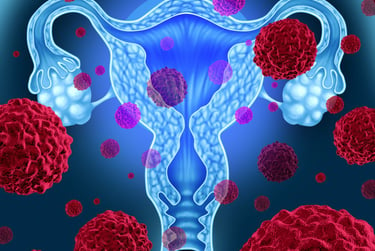Polycystic Ovary Syndrome (PCOS) Demystified: Empower Your Body, Reclaim Your Confidence, Live Well
Discover practical PCOS insights, symptoms, treatments, and lifestyle strategies to manage PCOS confidently and improve quality of life.
WELLNESS
Nutriprime
8/23/20255 min read


Introduction:
If you’ve ever heard the term PCOS and felt overwhelmed, you’re not alone. Polycystic Ovary Syndrome (PCOS) is a common hormonal condition that affects many people with ovaries, often starting in adolescence or early adulthood. It can impact energy, mood, weight, hair, skin, and fertility. The good news: understanding PCOS, working with healthcare professionals, and adopting targeted lifestyle changes can dramatically improve symptoms and overall well-being. This guide walks you through what PCOS is, common signs, possible causes, diagnostic steps, and practical strategies to feel like yourself again.
What is PCOS? A clear, compassionate overview
PCOS is a hormonal disorder characterized by a combination of symptoms rather than a single defining feature.
The most common signs include irregular or missed periods, excess androgen (which can cause acne, hair growth on the face/body, or thinning scalp), and polycystic ovaries visible on ultrasound.
Not everyone with PCOS has all symptoms, and severity can vary from person to person.


What is PCOS? A clear, compassionate overview
PCOS is a hormonal disorder characterized by a combination of symptoms rather than a single defining feature.
The most common signs include irregular or missed periods, excess androgen (which can cause acne, hair growth on the face/body, or thinning scalp), and polycystic ovaries visible on ultrasound.
Not everyone with PCOS has all symptoms, and severity can vary from person to person.
Possible causes and risk factors:
Hormonal imbalances, particularly higher levels of androgens (male hormones)
Insulin resistance and metabolic factors that can accompany weight gain
Genetics: a family history of PCOS can increase risk
Inflammation: low-grade inflammation may play a role in PCOS development
Lifestyle factors: diet, physical activity, sleep, and stress can influence PCOS symptoms and related health risks
Note: The exact cause of PCOS is not fully understood, and it likely results from a combination of genetic, hormonal, and environmental factors.
Diagnosis: what to expect with your healthcare provider
PCOS is diagnosed based on a combination of symptoms and tests. The Rotterdam criteria widely guide diagnosis, requiring two of the following three features:
Irregular or absent ovulation
Excess androgens (clinical signs like hirsutism or biochemical confirmation)
Polycystic ovaries on ultrasound
Your clinician may also check for:
Blood tests to assess hormone levels, thyroid function, and markers of inflammation
Glucose and lipid panels to evaluate metabolic health
A dental, skin, or hair assessment for signs of insulin resistance or metabolic syndrome
It’s important to rule out other conditions with similar symptoms, like thyroid disorders or adrenal issues.
Impact on daily life and long-term health
Symptoms can affect mood, energy, self-esteem, and relationships.
PCOS is associated with an increased risk of type 2 diabetes, high blood pressure, cholesterol abnormalities, sleep apnea, and infertility.
Early management and ongoing care can reduce long-term health risks and improve quality of life.
Management principles: a holistic approach
PCOS management is personalized. A combination of medical treatment, lifestyle adjustments, and supportive care often yields the best outcomes.
1-Medical treatments (discuss with your clinician)
Menstrual regulation: combined oral contraceptives or progestin therapy to regulate periods and reduce androgen symptoms.
Anti-androgen medications: stage-specific options to reduce acne and hair growth (often used with hormonal contraception).
Ovulation induction: for those seeking pregnancy, medications like letrozole or metformin may be considered (metformin can help with insulin resistance and may aid ovulation in some people).
Metabolic health: medications for insulin resistance or diabetes risk may be prescribed if indicated.
Inositol supplementation (myo-inositol and D-chiro-inositol):
What it is: Inositols are sugar-like compounds that influence insulin signaling and ovarian function. Myo-inositol is the most studied form in PCOS.
How it helps: Evidence suggests myo-inositol can improve insulin sensitivity, reduce serum androgens, promote more regular ovulatory cycles, and support oocyte quality, which can aid fertility and overall metabolic health.
Typical usage and dosing: Common regimens use myo-inositol in amounts around 2,000 mg to 4,000 mg daily, often divided into two doses. Some products combine myo-inositol with D-chiro-inositol (a ratio like 40:1 or 40:1 in some formulations) to target different aspects of insulin signaling. Your clinician can tailor the dose based on your needs, blood sugar status, and fertility goals.
Safety and considerations: Generally well-tolerated. It’s important to choose high-quality supplements and discuss with your healthcare provider before starting, especially if you have diabetes or are on other medications. Myo-inositol is not a substitute for prescribed medications but can be a complementary option for many people with PCOS.
What the research shows: Several studies and meta-analyses have found that myo-inositol improves cycle regularity, reduces androgens, and may enhance pregnancy rates in women with PCOS, with a favorable safety profile. Combining myo-inositol with lifestyle changes tends to yield better outcomes than lifestyle changes alone in some cohorts.
Note: The effectiveness of inositol can vary by individual, and not all patients will respond the same way. This is an area where personalized medical guidance is important.
2-Lifestyle strategies that make a real difference
Diet:
Focus on a balanced, nutrient-dense pattern rather than a “PCOS diet” per se.
Prioritize whole foods: vegetables, fruits, lean proteins, healthy fats, and high-fiber carbohydrates.
Consider a moderate reduction in refined carbohydrates and sugars to improve insulin sensitivity.
Some people find benefits from a lower glycemic index (GI) approach; others do well with a Mediterranean-style pattern.
Mindful portion sizes and regular meal timing can help with energy and cravings.
Physical activity:
Aim for a mix of aerobic exercise (e.g., brisk walking, cycling) and resistance training 2–4 times per week.
Even modest weight loss (5–10% of body weight if overweight) can improve ovulation, insulin resistance, and mood for many individuals.
Find activities you enjoy to sustain long-term adherence.
Sleep and stress management:
Prioritize 7–9 hours of sleep per night.
Stress-reduction techniques (mindfulness, yoga, deep breathing) can improve overall well-being and hormonal balance.
Skin and hair care:
Gentle, non-comedogenic skincare for acne-prone skin.
For hair management, discuss safe cosmetic or medical options with a dermatologist if hirsutism is bothersome.
3-Fertility considerations
PCOS is a common cause of infertility due to irregular ovulation but many people with PCOS can conceive with appropriate treatment.
If trying to conceive, a healthcare provider can guide you through ovulation-tracking, medications to induce ovulation, and fertility-safe exercise and nutrition plans.
Early preconception care is important to optimize outcomes.
Psychological and emotional support
PCOS can affect mood, self-image, and mental health.
Seek support from healthcare professionals, counselors, or support groups.
Building a strong support network can improve adherence to treatment and overall well-being.
Lifestyle plan: a practical 8-week starter
Week 1–2: Baseline and small changes
Start a simple daily activity: 20–30 minutes of brisk walking most days.
Add one high-fiber, low-GI lunch option.
Track your periods, workouts, sleep, and mood in a journal or app.
Week 3–4: Dietary tweaks
Swap refined carbs for whole grains, legumes, and vegetables.
Include a lean protein source at each meal.
Practice mindful eating for meals and snacks
Week 5–6: Exercise progression
Increase to 150–180 minutes of moderate activity weekly (spread across days).
Add two short resistance-training sessions or bodyweight workouts.
Week 7–8: Sleep and stress
Establish a consistent sleep schedule.
Try a 5–10 minute daily mindfulness or breathing routine.
Review fatigue, energy, and mood changes; adjust as needed.
Frequently asked questions
Is PCOS curable?
There’s no cure, but PCOS is highly manageable through lifestyle adjustments, medical treatment, and ongoing care. Many people experience improved symptoms and quality of life with a comprehensive plan.Can PCOS affect weight?
Weight changes can influence symptoms and insulin resistance, but PCOS can affect people across a wide range of body types. The focus is on sustainable lifestyle changes rather than quick fixes.Does everyone with PCOS have irregular periods?
Not always. Some may have regular cycles, especially with treatment, but many experience irregular ovulation or periods.Is PCOS related to diabetes?
There is an increased risk of insulin resistance and type 2 diabetes, particularly with certain metabolic factors. Regular screening and lifestyle management help mitigate risk.


